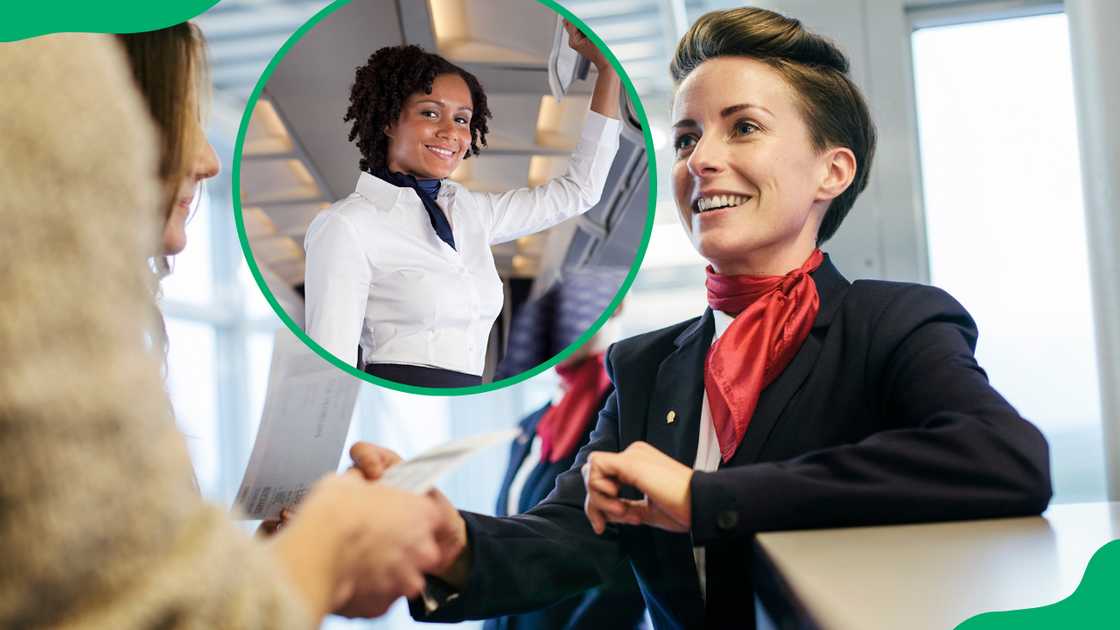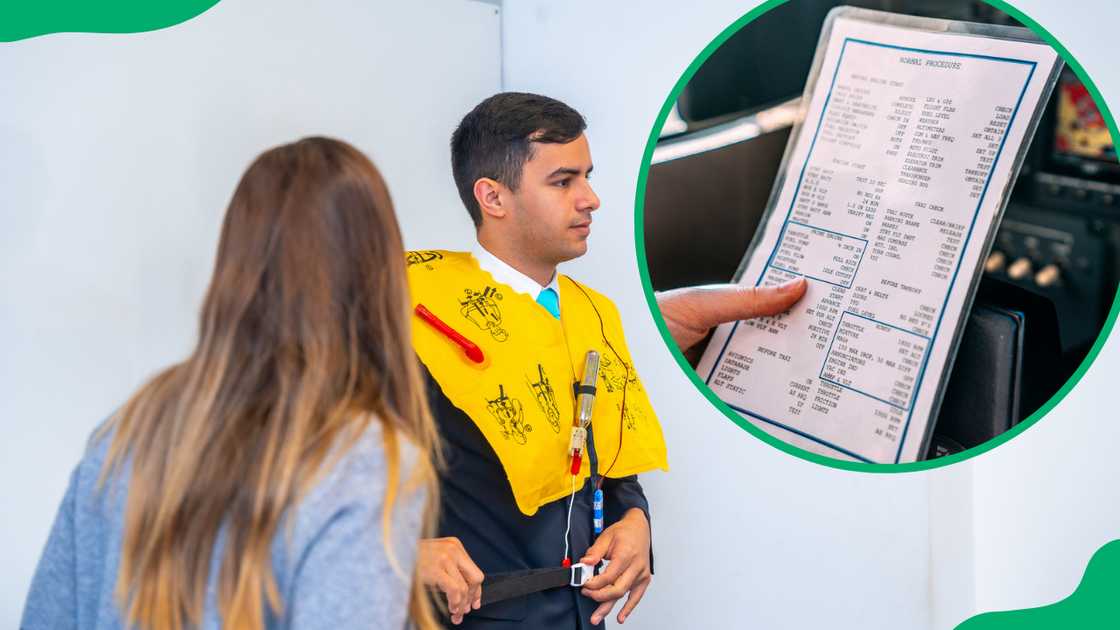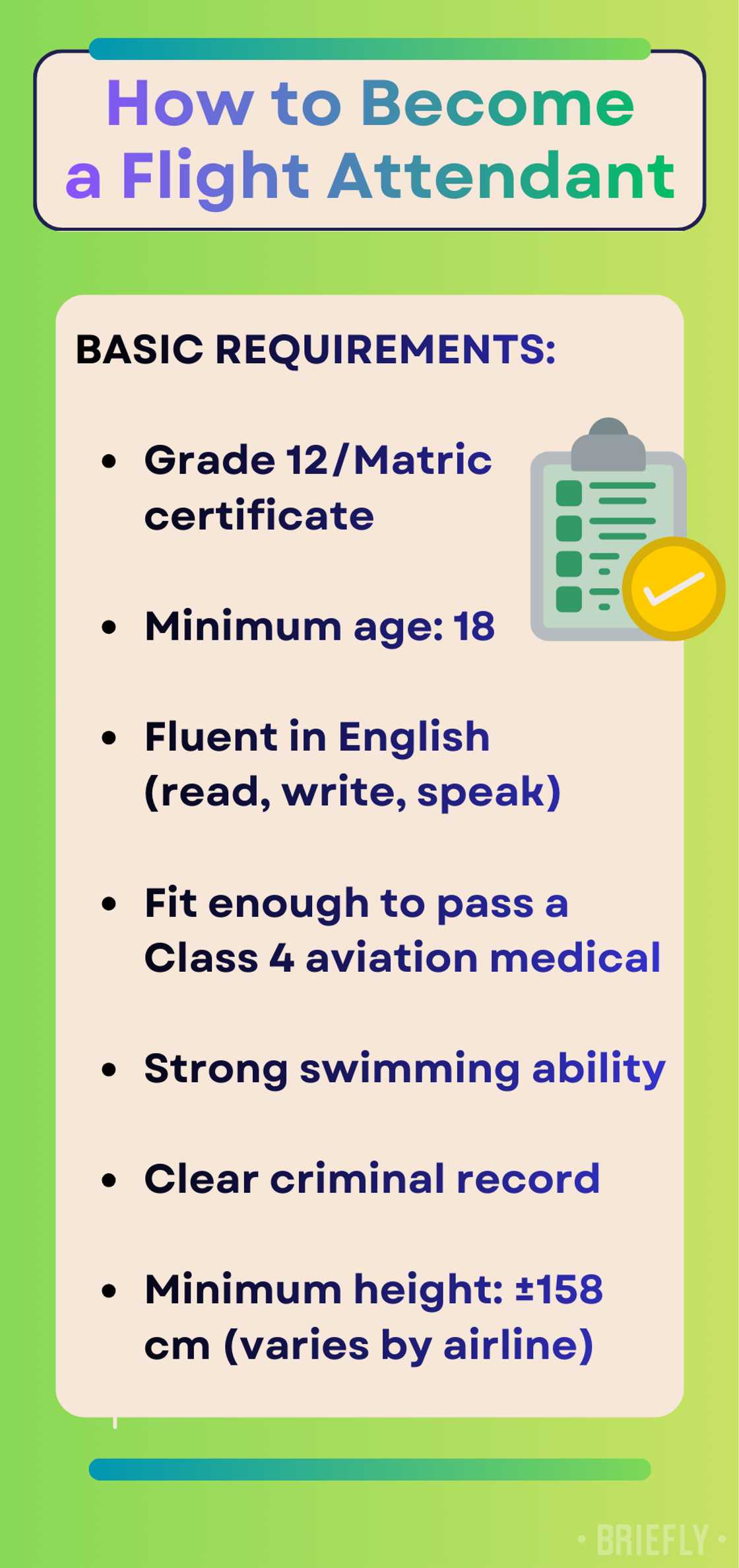How to become a flight attendant in South Africa: A complete guide
Knowing how to become a flight attendant in South Africa helps those wanting to follow their dreams follow the correct steps with minimal hassle. The minimum requirement is a high school diploma or GED. Although it is not required, a bachelor's degree can increase your chances of securing a job within the field.

Source: UGC
TABLE OF CONTENTS
Key takeaways
- There is no set list of flight attendant subject requirements in the country, but some subjects, such as travel, tourism, geography and mathematics, are beneficial.
- A South African flight attendant's salary depends on experience and the company that hired them, but the average income is estimated to be R12,579 monthly.
- You can apply for flight attendant jobs in South Africa on multiple job sites such as Indeed and Pnet, or directly via an airline.
How to become a flight attendant
Anyone hoping to follow their dreams of becoming a flight attendant or cabin crew must adhere to the following requirements:

Read also
A TikTok video highlighted short safety courses in South Africa as a pathway into safety officer jobs
- A grade 12/Matric certificate
- Be at least 18 years old
- Be proficient in English (written, spoken, and read)
- Fit enough to pass a class 4 aviation medical exam
- A strong/competent swimmer
- Have no criminal record
Flight attendants must also meet specific height requirements for safety reasons. In South Africa, the height requirements depend on the airline. However, the average minimal height is 158 cm.

Source: UGC
Flight attendant schools in South Africa offer compulsory training
One of the most important factors in flight attendant requirements is also basic training to obtain a cabin crew license, which is a must before you join an airline. Training is provided by aviation training organisations and lasts an average of six weeks or more. The course covers the following:
- Safety and emergency procedures (SEPT): This covers procedures and the use of emergency equipment, including survival kits and fire extinguishers.
- Emergency training: This includes correct use of evacuation slides, ditching and survival in water, live fire fighting and correct general emergency equipment use.
- Theory of flight: Detailing the basic principles regarding how aircraft fly.
- Air law: Educating students on the rules and regulations regarding aviation.
- Aviation medicine: Life-saving training, such as the handling of medical emergencies on board, learning first aid, CPR, and the correct use of onboard medical equipment.
- Aviation security: Detailing the procedures and policies regarding maintaining safety and security on board.
- Aircraft type rating: Training on specific aircraft, including the Boeing 737, with details on theoretical and practical aspects.
- Dangerous goods training: Education regarding how to identify and handle dangerous materials while in flight.
- Crew resource management (CRM): Highlights the importance of communication and teamwork amongst the flight crew.
The course is followed by an exam by the South African Civil Aviation Authority (SACAA), which will determine your future in aviation. Students who fail may retake the exam, but it is dependent on the type of exam and why they failed. Flight attendant school applications for 2025 may still be open, but it is dependent on the institution.

Source: UGC
Frequently asked questions
What qualifications are needed to be a flight attendant in South Africa?
You must be qualified by obtaining a cabin crew license. There are no specific subjects needed to become a flight attendant regarding high school, but subjects such as travel, tourism, geography and mathematics are advantageous.
How long does a flight attendant course take in South Africa?
Flight attendant courses are, on average, six to eight weeks full-time. However, some courses may take longer, between 11 and 12 weeks, with factors such as course intensity, the course provider, and any additional certifications determining the length.
Does NSFAS fund flight attendants?
NSFAS does not fund flight attendant qualifications. The organisation only funds students from financially disadvantaged backgrounds who study at public institutions, and studying to become a flight attendant is done via private institutions or relevant organisations.
How much do flight attendants get paid in South Africa?
The average flight attendant's income depends on the level of experience and the company they work for. According to Indeed, the average salary is R12,579 monthly. The same article reports the following cities as the highest-income areas in the country for the trade:
City/province | Salary |
Sandton, Gauteng | R30,048 |
Johannesburg, Gauteng | R20,372 |
Cape Town, Western Cape | R15,740 |
Mpumalanga, KwaZulu-Natal | R13,694 |
Durban North, KwaZulu-Natal | R12,732 |
Durban, KwaZulu-Natal | R12,582 |
Pretoria, Gauteng | R12,500 |
Potgietersrus (Mokopane), Limpopo | R12,133 |
Nelspruit, Mpumalanga | R11,697 |
Which airlines hire flight attendants in South Africa?
Airlines such as FlySafair, South African Airways (SAA), and Airlink, along with regional carriers like CemAir, are always on the lookout for new talent. Wealthy countries with international airlines such as Emirates and Qatar offer good opportunities overseas, but it is advised to also keep an eye on job sites such as Pnet, Indeed and even LinkedIn for any new local opportunities.
Conclusion
Knowing how to become a flight attendant in South Africa offers those wanting to follow their dreams a streamlined way to pursue the career. Certain high school subjects are not a requirement, but rather an advantage for airlines to consider. A cabin crew license is needed and can be obtained in around two months.

Read also
"Our national carrier": SAA cabin crew member's viral 'Khanyi Mbau's' dance challenge impresses SA

Source: Original
DISCLAIMER: This article is not sponsored by any third party. It is intended for general informational purposes only and does not address individual circumstances. It is not a substitute for professional advice or help and should not be relied on to make decisions. Any action you take based on the information presented in this article is strictly at your own risk and responsibility!
READ ALSO: 11 most dangerous jobs in the world: careers with the highest risks
Being a flight attendant may be considered risky by some due to the severity of a scenario where an aeroplane is compromised. For those curious, Briefly.co.za wrote an article detailing the 11 most dangerous jobs worldwide.
Cabin crew jobs, such as aircraft pilots and flight engineers are listed. Other job titles included truck drivers, commercial fishing crews, power line workers, and logging workers.
Source: Briefly News



